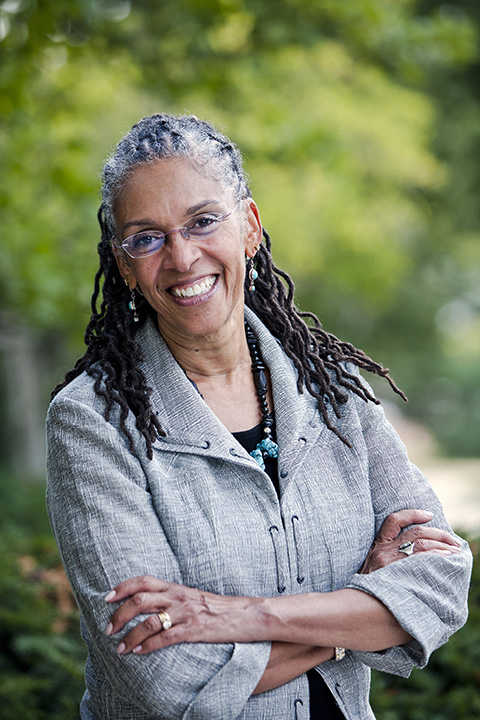
Bonnie Thornton Dill, who is the first black woman to serve as the Arts and Humanities dean, is also the founder of the university’s Consortium on Race, Gender and Ethnicity.
CORRECTION: Due to an editing error, this article incorrectly stated Bonnie Thornton Dill’s title. She is serving a two-year term as arts and humanities dean. The article has since been changed to reflect this correction.
While scholars devote years of study to one area of research, Bonnie Thornton Dill believes more answers can be found by looking at a fuller picture.
She has taught for years in the women’s studies department, is the founding director of the university’s Consortium on Race, Gender and Ethnicity and has served as the arts and humanities dean for more than a year, making her the first black woman to hold the position. In her studies of society, Thornton Dill found ideas developed best when they centered around the interweaving and overlapping of different fields.
“People were not looking seriously at gender as something that really shapes society,” she said. “I still think that women’s issues are very important, are still in some areas overlooked, certainly distorted and problematic if you look at what’s happening today.”
This “intersectional” approach is on center stage at the consortium, which aims to highlight and support research about several different subject areas and look at how they operate in relation to one another, she said.
Although gender is one of the consortium’s areas of analysis, Thornton Dill said she developed an interest in women’s studies before beginning to teach it at the university in 1991. Looking at women, families and careers and making the study of women and gender the focus of analysis is important because these topics change the way people look at the world, she said.
Understanding the history, she continued, is vital to realizing how important a field women’s studies remains, especially as statistics show women still earn less money than men in the same positions.
“These are battles we thought we had won,” she said. “The struggle continues — it is continuous.”
A passion for debate and discussion drove Thornton Dill to teach and later become chairwoman of the women’s studies department. While she enjoys the intellectual work of research and scholarship, Thornton Dill has a particular passion for helping young people embrace learning and new ideas.
“I guess I was always interested in things that would kind of change the world and improve it,” she said.
But teaching wasn’t the only outlet for Thornton Dill’s gender and equality scholarship.
As chair of the advisory board of scholars for Ms. Magazine, a feminist publication founded by Gloria Steinem, Thornton Dill helped push the view it takes a wide range of perspectives to paint a picture of a group of people. In the 1970s, she experienced firsthand the challenges of studying women’s issues as a black scholar.
“My colleagues and I contended that the gender analyses of that period were too often derived from the experiences of white middle-class women, and ignored the oft-untold stories of women of color and those without economic privilege,” she wrote in a 2009 Ms. Magazine editorial.
One of the most important functions of the magazine is training scholars to make their work comprehensible to an outside audience, she said.
“It kind of keeps me aware of the political and activist side of what’s going on,” she said.
Ryan Heisinger, who has worked as an ambassador for the arts and humanities college and served on the dean’s advisory board, said Thornton Dill’s innovation has helped propel the college forward.
“She’ll type away during meetings on her iPad with her bluetooth keyboard attachment,” said Heisinger, the Student Government Association’s academic affairs vice president. “She’s open to new, cool ideas, and she wants to work on them with students.”
As dean, one project Thornton Dill said she is most proud of is the creation of a series of videos featuring the work of different humanities scholars at the university. The project, she said, helps students grasp the concept of research discovery in the arts and humanities. One video was released earlier this month, and seven more are scheduled to be released through May.
“It translates what humanities scholars do into language that people who are not in the humanities can understand,” she said. “It’s engaging, it’s short, it begins to tell our research story.”
Women’s studies professor Ruth Zambrana said cooperation has always been one of Thornton Dill’s greatest strengths.
Zambrana, who has known Thornton Dill since 1978, worked on establishing the Consortium on Race, Gender and Ethnicity and edited a collection of essays published in 2009 with Thornton Dill.
Zambrana said Thornton Dill stands out in her job because she makes others feel as if their ideas are being heard and considered and thinks practically about the options while still thinking outside the box.
“I always see her as an exemplar of a statesperson, of a diplomat. She has tremendous patience,” Zambrana said. “Her greatest asset is the ability to listen.”



